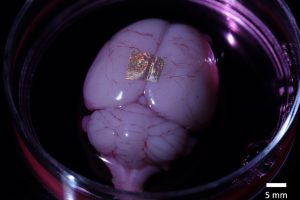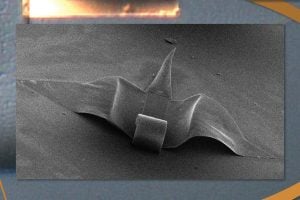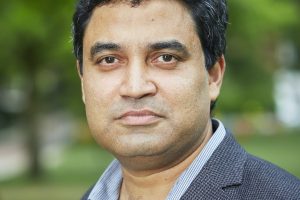David Gracias, a professor of chemical and biomolecular engineering, is known for the design, development, and characterization of miniaturized devices, intelligent materials, and systems. Many of these devices and systems are far smaller than what can be visualized with the naked eye or even optical microscopes, which makes them especially challenging to assemble and characterize.
Gracias’ multidisciplinary approach leverages conventional microelectronic chip fabrication as well as biofabrication and novel self-assembly processes. His laboratory is known for utilizing elements from both the biotic (bacteria, cells) and abiotic (optical, electronic) worlds to create bionic structures. The laboratory utilizes state-of-the-art fluorescence, FT-IR, Raman, and sum-frequency generation optical spectroscopy techniques; electron microscopy; RF measurements such as GHz spectrum analysis; electrochemical methods such as potentiometry and chronoamperometry; and four-point electrical testing with femto-amp resolution. Students also utilize statistical and analytical methods to model data as well as finite element methods (HFSS, Surface Evolver, COMSOL).
Gracias and his team have developed entirely new approaches to assemble and manufacture extremely small 3D and hybrid devices in a highly parallel and cost-effective manner. He has pioneered the field of self-folding by uncovering assembly principles based on strain engineering. His notable accomplishments include the self-assembly of patterned polyhedral capsules, particles, and devices with sizes down to 100 nanometers, which opens up applications in electronics, sensors, and drug delivery. His laboratory invented dust-sized biopsy forceps that can be deployed and operated en masse, offering the possibility for a statistical sampling of organs and the early diagnosis of diseases such as cancer, and representing a major leap toward realizing the “swallow the surgeon” vision. Along with colleagues, he has invented programmable materials and soft robots that respond to biochemical cues offering the possibility for autonomous untethered operation. More recently he has been a founding member of the field of organoid intelligence (OI) with notable inventions on microscale EEG-like caps and single cell/organ tattoos.
Gracias’ unique training in basic sciences, including physical chemistry and chemical biology, as well as in state-of-the-art engineering R&D in the microelectronics industry, allowed him to break down traditional boundaries by making critical connections between seemingly disparate fields and between basic science and applied research. At Johns Hopkins, Gracias has made revolutionary contributions to biomedical engineering by collaborating extensively with clinicians to apply the capabilities of micro and nanotechnology to modern medicine. In addition to publishing his academic work in top journals such as Science, Gracias is a prolific inventor with 36 issued patents, many of which are commercialized.
Gracias has received the NIH Director’s New Innovator Award; NSF CAREER Award; Beckman Young Investigator Award; Camille Dreyfus Teacher-Scholar Award; DuPont Young Professor Award; Maryland Outstanding Young Engineer Award; a Humboldt Fellowship for Experienced Researchers; and Friedrich Wilhelm Bessel Research Award. He has been elected a fellow of a number of prestigious international societies such as the AAAS, IEEE, AIMBE, APS and RSC.
Gracias earned an integrated MS in chemistry from the Indian Institute of Technology (1994) and a PhD in chemistry from the University of California at Berkeley and the Materials Science Division, Lawrence Berkeley National Laboratory (1999). He was a postdoctoral fellow in the Department of Chemistry and Chemical Biology at Harvard University (1999-2001).
Secondary Appointments: Chemistry, Materials Science and Engineering, and Laboratory for Computational Sensing and Robotics (LCSR)—Johns Hopkins University (JHU); Oncology, Center for Microphysiological Systems (MPS), and Sidney Kimmel Comprehensive Cancer Center (SKCCC)—Johns Hopkins School of Medicine



